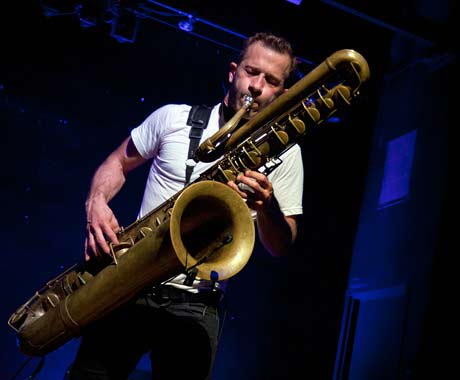"There's a whale in the Atlantic," says Colin Stetson, unassumingly clad in white T and black jeans, "whose song is wrong by a few hz, and therefore unintelligible to other whales. This whale is alone in a large body of water, swimming, singing its song, calling for a likeness it will never find. When I play this song, I can't help but think about this whale, who right at this very minute is singing alone."
And that, aspiring musicians, is how to introduce a "new one." Indeed, for all his modesty, Stetson is an accomplished showman beneath the understated facade; the romance of the lone, resilient whale, undercut by a sense of irreplaceable tragedy or loss, makes an appropriately extravagant analogy for his music — and he knows it.
Which is to say the Stetson live experience, while technically minimal, doesn't lack for grandeur. Made in 1910, his trademark bass saxophone, an unwieldy, scuffed brass artefact the size of a young elephant, is almost as old as the Great Hall. For percussion he relies solely on the brass-on-brass thump of keys hitting the instrument's body. As fingers fire like pistons, protruding muscles dance up and down his left arm, the mechanics of virtuosity. His adaptation of circular breathing is intensity embodied, incorporating acrobatic flutters, surging polyrhythms and deep howls that tear forth from his lungs. It's as breathtaking for audience as performer.
As momentum builds, Stetson's facial expression contorts into that of a drowning man. You kind of wish someone would tell him to take it easy. Not that that's likely — the opening alto-sax suite draws the kind of ovation usually reserved for three-act operas. How such tremendously mournful music gets so euphoric a reaction is a matter of physicality. Clutching the instrument as if it were his deceased firstborn, Stetson rocks back and forth, cheeks bulging out like windswept sails. The emotion in the performance, and performer, is palpable.
Though dominated by a smattering of songs from New History Warfare Vol. 3: To See More Light, the show is effectively a continuous tour de force. The symphony, as it can only be described, ends with "Part of Me Apart From You," a balletic display of composure — energy transformed into love and despair.
As much as it engages, however, his music is a blank canvas, designed to resonate with many in many different ways. Perhaps most impressive tonight is the diversity of reactions: some laugh in appreciation, others keel over, a few look close to tears. Shared among them is a feeling of appreciation, or reverence of an admired artist fast-becoming iconic — not just in Canadian music but worldwide. Suffice to say, as crowd members spill into the night, the prospect of watching hockey in a chintzy metropolitan bar seems unappetising somehow, which you suspect indicates the music has amply served its purpose.
And that, aspiring musicians, is how to introduce a "new one." Indeed, for all his modesty, Stetson is an accomplished showman beneath the understated facade; the romance of the lone, resilient whale, undercut by a sense of irreplaceable tragedy or loss, makes an appropriately extravagant analogy for his music — and he knows it.
Which is to say the Stetson live experience, while technically minimal, doesn't lack for grandeur. Made in 1910, his trademark bass saxophone, an unwieldy, scuffed brass artefact the size of a young elephant, is almost as old as the Great Hall. For percussion he relies solely on the brass-on-brass thump of keys hitting the instrument's body. As fingers fire like pistons, protruding muscles dance up and down his left arm, the mechanics of virtuosity. His adaptation of circular breathing is intensity embodied, incorporating acrobatic flutters, surging polyrhythms and deep howls that tear forth from his lungs. It's as breathtaking for audience as performer.
As momentum builds, Stetson's facial expression contorts into that of a drowning man. You kind of wish someone would tell him to take it easy. Not that that's likely — the opening alto-sax suite draws the kind of ovation usually reserved for three-act operas. How such tremendously mournful music gets so euphoric a reaction is a matter of physicality. Clutching the instrument as if it were his deceased firstborn, Stetson rocks back and forth, cheeks bulging out like windswept sails. The emotion in the performance, and performer, is palpable.
Though dominated by a smattering of songs from New History Warfare Vol. 3: To See More Light, the show is effectively a continuous tour de force. The symphony, as it can only be described, ends with "Part of Me Apart From You," a balletic display of composure — energy transformed into love and despair.
As much as it engages, however, his music is a blank canvas, designed to resonate with many in many different ways. Perhaps most impressive tonight is the diversity of reactions: some laugh in appreciation, others keel over, a few look close to tears. Shared among them is a feeling of appreciation, or reverence of an admired artist fast-becoming iconic — not just in Canadian music but worldwide. Suffice to say, as crowd members spill into the night, the prospect of watching hockey in a chintzy metropolitan bar seems unappetising somehow, which you suspect indicates the music has amply served its purpose.




